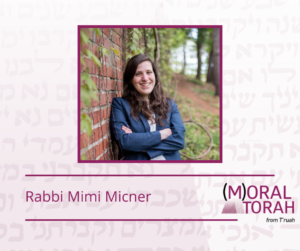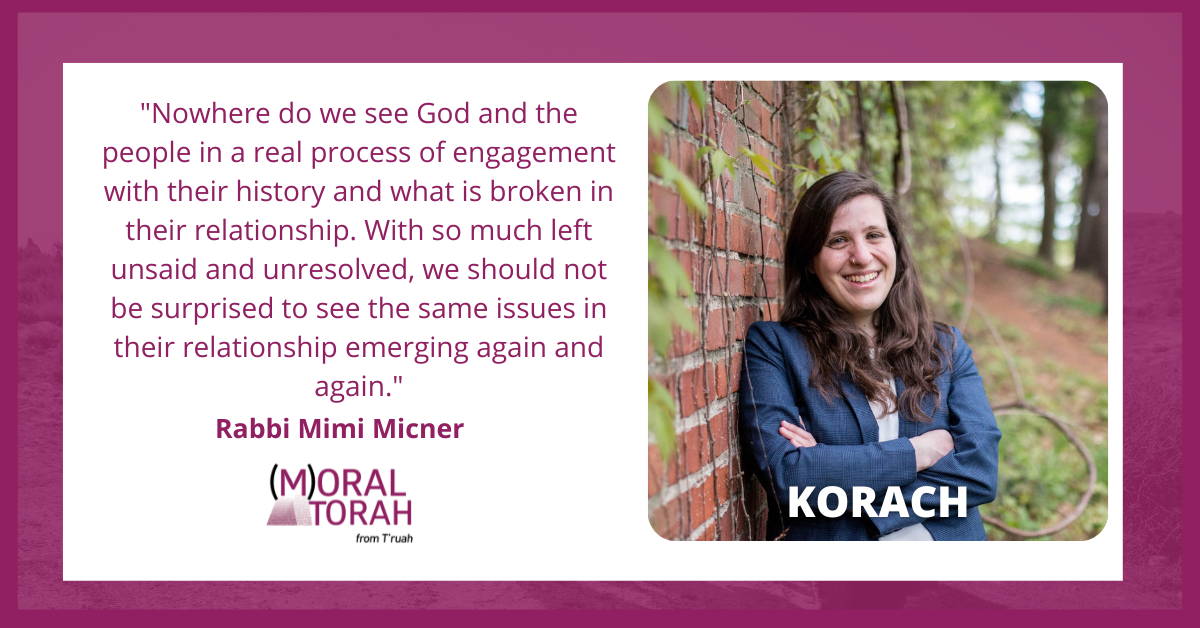A D’var Torah for Parshat Korach by Rabbi Mimi Micner
The story of Korach’s rebellion illustrates how toxic it can be when a society’s underlying wounds remain unhealed.
After Korach and his band of followers rebel against Moses’ leadership, Moses and God set up a miraculous event to show that God is with Moses and that he is the legitimate leader of the people of Israel. The entire community gathers round, and they see God split open the ground beneath Korach, Dathan, Abiram, and their households. The earth swallows them up, they descend alive to Sheol, and the earth closes over them. With this miracle, the leaders of the rebellion vanish, and Moses and Aaron are victorious.
Now what is so interesting about this miracle is that it fails to inspire the unshakeable trust and confidence that Moses and God might have hoped for. Although God takes an action that is incredibly powerful and decisive, making a “brand-new creation” (Numbers 16:30), the Israelites remain as doubtful and rebellious as they had ever been. The following day, they once again turn against Moses and Aaron, saying: “You have killed God’s people!” (Numbers 17:6).
Sign up to receive (M)oral Torah in your inbox each week.
In the eyes of many commenters, this response signifies just how doubtful of God and Moses the Israelites remain. Ibn Ezra (12th century Spain) teaches that, with this response, they are disputing that the earth swallowing up Korach is proof that God has chosen Moses and Aaron over Korach. It is possible that those who offered the fire pans were burned because of Moses’ prayer or some secret wisdom he had (Ibn Ezra on Numbers 17:6). Ramban (13th century Spain) clarifies Onkelos’ 2nd-century Aramaic interpretation: The Israelites’ negative response suggests they believed Moses set Korach up to offer a strange fire that Moses knew was forbidden (Ramban on Numbers 17:6).
In other words, even after what might seem like a decisive display of God’s power – even after a miracle that should have inspired unshakable confidence in their leaders – the people of Israel return to their previous faithlessness. As modern Bible scholar Nechama Leibowitz put it so well: “Everything returned to its previous order. The fire disappeared, the earth closed its mouth and the people reverted to their grumbles and lack of faith and limited conceptions” (Studies in Bamidbar, 213). Far from resolving the people of Israel’s doubts and quieting their grievances, the Israelites’ reaction to Korach’s death suggest that the underlying issues in the relationship between God and the people of Israel remain unresolved.
Yet perhaps their reaction is unsurprising. Nowhere do we see God and the people in a real process of engagement with their history and what is broken in their relationship. Nowhere do we see them attempting to do the work of healing with one another. With so much left unsaid and unresolved, we should not be surprised to see the same issues in their relationship emerging again and again.
Find more commentaries on Parshat Korach.
We see this in our own politics in painful ways. As a country, we have failed miserably to reckon with the sins of our past and to meaningfully address the wounds they have created in the present. We have failed to do any real truth-telling or do any deep grappling with our history of racism and indigenous genocide, and because of this, we face the same issues again and again in our politics, with different iterations of racial injustice plaguing us generation after generation.
 As a country, our only real hope for transformation is honesty. As Bryan Stevenson said so well in his Yom Kippur conversation with Rabbi Sharon Brous: “I think something better is waiting for us. There is something that feels more like freedom, feels more like equality, feels more like justice, waiting for us in this nation. But we cannot get it, we cannot achieve it until we have the will, the courage to talk honestly about our past, to own up, to confess and repent, to acknowledge the harms and the wrong.” In this time of violence and devastation, may we be blessed with such courage.
As a country, our only real hope for transformation is honesty. As Bryan Stevenson said so well in his Yom Kippur conversation with Rabbi Sharon Brous: “I think something better is waiting for us. There is something that feels more like freedom, feels more like equality, feels more like justice, waiting for us in this nation. But we cannot get it, we cannot achieve it until we have the will, the courage to talk honestly about our past, to own up, to confess and repent, to acknowledge the harms and the wrong.” In this time of violence and devastation, may we be blessed with such courage.
Rabbi Mimi Micner is the rabbi of a small Conservative synagogue in the Boston suburbs and serves as faculty for the Inside Out Wisdom and Action Project. Before becoming a rabbi, she was a community organizer, and during rabbinical school she was a T’ruah Summer Fellow in 2015.

